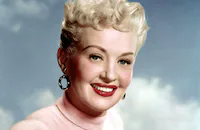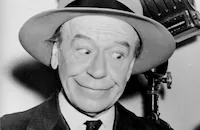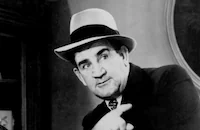Old Man Rhythm

Brief Synopsis
Cast & Crew
Edward Ludwig
Charles Buddy Rogers
George Barbier
Barbara Kent
Grace Bradley
Betty Grable
Film Details
Technical Specs

Synopsis
When John Roberts, Sr., the co-owner of the Roberts Doll Manufacturing Company of Silverton, New York, hears from his assistant, Paul Parker, that his son Johnny is spending more time on co-ed Marion Beecher than on his academic studies or on his childhood sweetheart, Edith Warren, he leaves immediately for Fairfield College to assess the situation personally. Unable to dissuade Johnny from pursuing Marion, Mr. Roberts decides to enroll in the school as a freshman and keep an eye on his son's activities. After quickly becoming the most popular student at Fairfield, Mr. Roberts makes Pinky Parker, Paul's shy son, his confidant. At Pinky's suggestion, Mr. Roberts writes a letter to Paul asking him to write back and pretend that the toy business is bankrupt, in hopes of fooling Marion into thinking that Johnny's fortune is lost. The letter, which has been entrusted to Phillips, an absent-minded school employee, is never sent. However, because of Mr. Robert's much publicized collegiate antics, the business genuinely begins to fail, causing Paul and partner Frank Rochet to panic. Marion, meanwhile, fights with Johnny over Edith and then plays on Edith's innocent kindness by threatening to quit school, which encourages Johnny to propose an elopement after the prom. At the dance, Mr. Roberts is relieved by the arrival of Paul and Rochet, who discuss the financial troubles of the toy company in front of Marion. As predicted, Marion has a sudden change of heart and jilts Johnny, who, now wiser, returns to the faithful Edith, thus allowing his father to end his charade and rescue his business.

Director

Edward Ludwig
Cast
Charles Buddy Rogers

George Barbier

Barbara Kent
Grace Bradley

Betty Grable

Eric Blore

Erik Rhodes

John Arledge

Johnny Mercer

Donald Meek
Evelyn Poe
Dave Chasen
Joy Hodges

Douglas Fowley
Margaret Nearing
Ronald Graham
Sonny Lamont
Bill Carey

Lucille Ball

Tom Kennedy
Virginia Reid
Allen Vincent
Bryant Washburn Jr.
Carlyle Blackwell Jr.
Erich Von Stroheim Jr.
Claude Gillingwater Jr.
Crew
George Crone
P. J. Faulkner Jr.
Perry Ferguson
Lewis Gensler
Lewis Gensler
Lewis Gensler
H. W. Hanemann
Don Hartman
Sig Herzig
Sig Herzig
Johnny Mercer
Nick Musuraca
Zion Myers
Ernest Pagano
Hermes Pan
Van Nest Polglase
John Tribby
Glenn Tryon
Roy Webb
Sam White

Videos
Movie Clip


Film Details
Technical Specs

Articles
Old Man Rhythm
Old Man Rhythm (1935), Mercer's film debut, was a run-of-the-mill college musical. The film's gimmick is that a successful businessman (George Barbier) enrolls in college so he can keep an eye on his son (Buddy Rogers), a student who's in the clutches of a gold digger. Soon, Pop becomes a Big Man on Campus, but meanwhile he's neglecting his business.
For a B-college musical, Old Man Rhythm has some A-talent. Stellar character actors Eric Blore, Erik Rhodes and Donald Meek play supporting roles with their usual droll expertise, and future star Betty Grable shines in one of her early bits as a dancing coed, thanks to choreography by Astaire favorite Hermes Pan. Lucille Ball can be spotted in a non-speaking part as a college girl. Playing a colonel, Mercer proved that he had little onscreen charisma, and after acting in one more film, To Beat the Band (1935), it was clear that Mercer's talent lay in songwriting. He never appeared in another film. Mercer's songs for Old Man Rhythm, with music by Lewis Gensler, never became standards, but they're fresh and lively and fun.
One place where Old Man Rhythm was a hit was in Mercer's home town. The theater marquee in Savannah read "Old Man Rhythm starring Johnny Mercer." Audiences applauded when Mercer sang his number, his father reported proudly. Despite Mercer's lackluster film debut, other RKO producers sought him out to perform or write songs for their films. But ever the Southern gentleman, he stuck by the producer who had hired him.
Mercer had hoped to write songs for the Astaire-Rogers musicals, but by the time he arrived at RKO, those musicals were so successful that only the top-tier songwriters were writing for the team. But while Mercer was recording songs for To Beat the Band, Astaire came into the studio and asked Mercer to write some lyrics for a song he'd written. The song was "I'm Building Up to an Awful Letdown," and Astaire had a hit record with it. By the time Mercer's two-picture contract at RKO was over, he was in demand all over town. He wrote songs for movies from the 1930s through the 1960s, for radio, for seven Broadway shows, and for some of the best singers in the world. He was one of the founders of Capitol Records, and won two Academy Awards. He never became a movie star, but after his inauspicious beginning as a performer, Johnny Mercer found his calling in Hollywood as one of the masters of the great American songbook.
Director: Edward Ludwig
Producer: Zion Myers
Screenplay: Sig Herzig, Ernest Pagano, H.W. Hanemann, based on a story by Lewis Gensler, Sig Herzig and Don Hartman
Cinematography: Nicholas Musuraca
Editor: George Crone
Art Direction: Van Nest Polglase, Perry Ferguson
Choreography: Hermes Pan, Sam White
Music: Lewis Gensler
Cast: Charles "Buddy" Rogers (Johnny Roberts), George Barbier (John Roberts, Sr.), Barbara Kent (Edith Warren), Grace Bradley (Marion Beecher), Betty Grable (Sylvia), Eric Blore (Phillips), Erik Rhodes (Frank Rochet), John Arledge (Pinky Parker), Johnny Mercer (Colonel), Donald Meek (Paul Parker).
BW-75m.
by Margarita Landazuri

Old Man Rhythm
Quotes
Trivia
Notes
The working title of this film was Papa's in the Cradle. According to Hollywood Reporter, Buddy Rogers won the lead in the picture after John Beal, Gene Raymond and Randolph Scott had been considered. RKO borrowed George Barbier from Paramount for the production. A Hollywood Reporter news item described four actors in the cast-Bryant Washburn, Jr., Carlyle Blackwell, Jr., Erich von Stroheim, Jr. and Claude Gillingwater, Jr.-as "second generation of film famous." The Daily Variety preview review listed the running time as 86 minutes, suggesting that about eleven minutes were cut from the final film. Modern sources add Marian Darling, Jane Hamilton, Maxine Jennings, Kay Sutton (College girls) and Jack Thomas to the cast.














